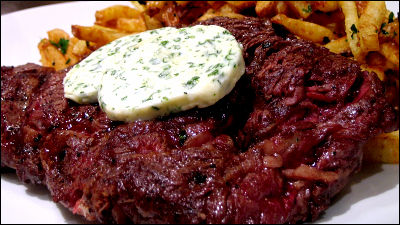Even with the same calories, the ease of gaining weight differs depending on the food, why?

Humans live by ingesting energy sources in the form of food from the outside world. The amount of energy obtained from food is expressed by a unit called 'calories ', and there is a common wisdom that 'if you consume too many calories, you will gain weight'. Theresy teaches about food science and nutrition at the University of Mississippi in the United States about the question about such calories, 'Is there a difference between taking the same calories but taking only protein and taking only carbohydrates?' Traal-Patterson explains.
Not all calories are equal – a dietitian explains the different ways the kinds of foods you eat matter to your body
https://theconversation.com/not-all-calories-are-equal-a-dietitian-explains-the-different-ways-the-kinds-of-foods-you-eat-matter-to-your-body- 156900
Calories are a unit of energy, and 1 kilocalorie (kcal) is defined as 'the energy required to raise the temperature of 1 liter of water by 1 degree under standard atmospheric pressure'. According to this definition, 1 kcal, whether derived from protein or carbohydrate, can raise the temperature of 1 liter of water by 1 degree, but according to Tolar-Patterson, 'It is given to the body depending on what calories it is derived from. The impact is different. '
In order to understand the cause, it is important how the concept of calories was born. Wilbur Olin Atwater, a 19th-century scientist who was the creator of the concept of calories and also known as the 'father of modern nutrition,' said 'the amount of heat released by burning food' to understand the amount of energy contained in food. We have devised a method of measuring (burning heat) and excluding the amount excreted as feces and urine that cannot be absorbed by the human body. '
The calorie notation of food is based on an experiment that calculated 'the amount of heat lost from the poop of a human who ate' --GIGAZINE

Even in modern America and Japan, calories are calculated based on the 'modified Atwater coefficient ' based on the idea of Atwater, such as '4 kcal per 1 g of protein, 9 kcal per 1 g of fat, 4 kcal per 1 g of carbohydrate'. Total calories are calculated according to the standard.
However, according to Tolar-Patterson, research has shown in recent years that 'even with the same calories, the body's energy expenditure fluctuates depending on the dietary content.' In a 2012 study , people who continued to eat a low-carbohydrate diet, despite continuing to consume the same amount of calories, consumed 300 kcal more energy per day than those who continued to eat a low-fat diet. It is reported that. In addition, a 2004 study reported that 30-35% of the daily calorie intake was derived from protein without changing the amount of calories consumed, resulting in an increase in energy expenditure. In general, a carbohydrate- and fat-rich diet has the effect of increasing energy expenditure by 4-8%, and a protein-rich diet has the effect of increasing resting metabolic rate by 11-14%. It is said that there is.
These studies have shown that 'even if the calories are the same, the effects on the body differ depending on the calorie source.' Therefore, the dietitian is paying attention to the ' glycemic index (GI value) ' as an alternative index to calories. The GI value is a numerical value that indirectly expresses 'how much the blood sugar level rises', and in recent studies, when the blood sugar level rises, the amount of insulin secreted increases, which affects metabolism and causes surplus energy. It has been shown that it is easy to store as fat, so the GI value is important.
Carbohydrates such as white rice, cakes, cookies and potato chips generally have a high GI value, and green and yellow vegetables, mushrooms and legumes have a low GI value. According to Tolar-Patterson, studies have also reported that foods with a low GI value help regulate blood sugar levels regardless of calories.
Relationship between blood glucose level and GI | Otsuka Pharmaceutical
https://www.otsuka.co.jp/health-and-illness/glycemic-index/glucose-level/

It's also important to get fiber and avoid empty calories when you're on a diet, Trall-Patterson points out. Regarding dietary fiber, since the human body cannot convert dietary fiber contained in vegetable foods such as fruits, vegetables, whole grains, and beans into energy, foods high in dietary fiber give a strong feeling of fullness, but the actual calories are It tends to be low. On the other hand, empty calories are foods that are said to 'contain almost no nutrients but are high in calories,' and are described as 'harmful,' according to Tolar-Patterson. Foods with high empty calories include potato chips, potatoes, sugar-containing beverages, and meat, and foods with low empty calories include vegetables, whole grains, fruits, nuts, and yogurt.
Calories are arguably the most important factor in dieting, but Tolar-Patterson also points out that 'weight alone is not healthy.' High-protein diets have been shown to be beneficial for dieting in the short term, but areas with long life expectancy are predominantly plant-based diets and rarely consume animal-based protein. There is a research result . Mr. Traal-Patterson often hears from friends and others that he has become fat because of carbohydrates and that he has to go on a sugar-restricted diet. It's also found in apples and spinach, and if you limit the former, you'll be healthy, but limiting the latter is counterproductive. With plant-based proteins made from vegetables, fruits, nuts, and legumes. A carbohydrate-based diet is the healthiest diet that helps prevent heart disease, cancer, high blood pressure, and many other chronic illnesses, 'he said. I have.
Related Posts:






